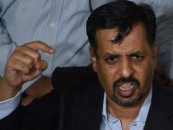Ordinance raj
A procedural and brief summary rubberstamped by cabinet cannot suffice as advice

During a 1973 parliamentary debate, the specific intent behind the constitutional provision, Article 89 — which allows the President to step into the role of the legislature and make laws through ordinances — was recorded as covering the period between the dissolution of parliament and a general election, where an allocated budget has expired or not been allocated, and unforeseen expenditure can be met to ensure the affairs of government are not brought to a standstill. “A period of four months, when the National Assembly stands dissolved and if there is no Budget which has been authenticated or the period for which the budget has been authenticated has already expired, or there are certain such expenses.” And there are “some unforeseen expenditure in case of dissolution of the Assembly…. there is a gap. And in order to cover that gap when…elections shall be held within a period of ninety days, a period of four months has been provided to meet the expenditure to run the affairs of the Government.”
Article 89 allows the President to promulgate ordinances with two main requirements to be satisfied: when the National Assembly or Senate are not in session and the President is “satisfied that circumstances exist which render it necessary to take immediate action”. Further to this, the ordinance does not work in perpetuity, only granted to exist for 120 days, after which it expires unless it is presented to, and approved by, parliament. Another important caveat to this Presidential power is that the President must not act alone; he must act based on advice and aid from the executive. A 2020 IHC judgement, among other issues, poses this very question: can and does the President act alone, or must Presidential power be exercised in unison with, if not in obedience to, the executive. The judgement states “…the President cannot act except in accordance with the aid and advice of the Cabinet, as such the executive, which is vested with this legislative power”.
The judgement goes on to say that this requirement is based “on a democratic political structure”. Article 48 of the Constitution makes this requirement clear by stating that “in exercise of its functions, the President shall act on and in accordance with advice of the Cabinet or the Prime Minister.” Because the primary prerogative of the legislature is being usurped under Article 89, the Constitution demands that before the President attempts to exercise his power under Article 89, advice from the cabinet or Prime Minister must be sought. In very limited circumstances can the President exercise his discretion without advice. In the 2020 IHC judgement, a case with regard to the Pakistan Medical Commission Ordinance 2019, the court noted, “there was no reason, objective and factor”, which justified the approval of the said Ordinance. It would also be safe to argue that in a parliamentary-style democracy detail of the advice given to the President must be tangible enough for public consumption. It would be wise for the Prime Minister to explain the reason behind the use of this alternative form of law-making, particularly on pertinent issues, where otherwise there would be open parliamentary debate and scrutiny.
A procedural and brief summary rubberstamped by cabinet cannot suffice as advice. Particularly, when there is no state of emergency, the basic requirement of the advice must explain why there is a deviation from convention of placing the draft law before parliament. This concern was also expressed in the IHC 2020 judgement where it is noted that “the legislature belongs exclusively to the representatives of people” and “when this authority has been abused without going into the parliamentary debate and forums, it will be considered as bypassing the process envisaged in the constitutional mandate.” This need to provide reasons for advising the President to bypass parliament becomes more urgent when over 50 ordinances have been passed since 2018, under ordinary circumstances and while parliament has been in session. Let us take the example of the latest NAB ordinance, which rids the Supreme Judicial Council of the power to remove the NAB chairperson, and bestows this power instead with the PM. This ordinance dangerously attempts to tilt the balance, by taking power away from collective decision-making of authorised bodies and shifting it to individual, authoritarian, rule. This amendment also blurs the checks placed on the PM, allowing room for whimsical decision-making and potential abuse of power.
Such a law should not be clothed in secrecy and justified by constitutional provisions, which have been interrupted narrowly and used without its actual spirit being comprehended. Other ordinances since 2018 include the anti-rape ordinance where the power of the Prime Minister (instead of institutions and relevant departments) is pronounced, by giving him the authority to establish anti rape cells, funds and frame rules; the Pakistan Medical Commission ordinance, which has been challenged in the Islamabad High Court; the Elections (Amendment) Ordinance, which is considered controversial by many with regard to electronic voting machines; Pakistan Media Development Authority (PMDA) Ordinance, and ordinances related to FATF and consular access to RAW spy Kulbhushan Jadhav. These ordinances have now been approved as law in the recent joint session of the parliament where 33 ordinances were passed into law. Despite this, what we have still been denied are the details of these laws and the debate that allows input from all sides of the parliamentary aisle.
An Apex Court judgement in a 2018 noted that the Constitution does not “constitute the President’s power into a parallel source of lawmaking or an independent legislative authority” and “President cannot be accepted as a parallel source of law-making”. The court goes on to say that Article 89 should only be invoked in an emergency and where waiting for the next session of parliament may cause “irreparable loss to the people of Pakistan”. Keeping the court’s interpretations of these constitutional provisions in mind and viewing the joint session of parliament on 17th November, it would not be difficult to argue that the current wave of law-making through ordinances has been mala fide, and staying a precedent of taking power away from parliament. All these ordinances have far-reaching consequences and their lack of detail or debate before they are stamped into law is not only harmful to democratic practices but reinforces the argument that this government is still not comfortable with debate and consensus.
Looking at governance in India, Brazil, Belarus and Turkey today, it seems the season of global authoritarian rule has arrived, and the current Ordinance Raj under PTI places us safely in the same camp as these other countries. Or perhaps we have missed the intention altogether — perhaps the undermining of democratic institutions carried out with such determination and consistency is because they are not valued in the Naya Pakistan we have been promised.















COMMENTS
Comments are moderated and generally will be posted if they are on-topic and not abusive.
For more information, please see our Comments FAQ